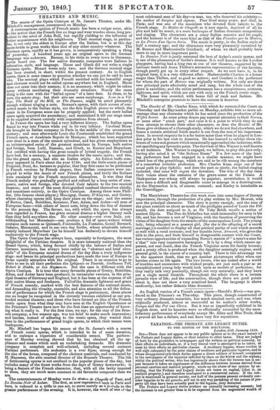The Marylebone Theatre has this week risen into some degree
of literary importance, through the production of a play written by Mrs. Mowatt, who acts the principal character. The story is pretty enough; and the tone of the piece reminds us about as much of the profligate period of Louis the Fif- teenth, the date assigned to it, as Sir Toby Belch recalls a notion of ancient Elyria. The Due de Richelieu has sunk immorality for once in his life, and has become a sort of Virginius, with the function of preserving the virtue of his daughter from the attacks of the unscrupulous Louis. The young lady, being educated as a peasant girl, (for she is the offspring of a secret marriage,) is enabled to display all that poetical purity of soul which accords so well with a rural costume; and her humble lover, Armand, who gives the title to the piece, and finds himself in disagreeable contact with the Court, has various opportunities of expanding Burns's maxim of" a man's a man for a' that" into very impressive harangues. It is by a drug which causes ap- parent, not real death, that the French Virginius saves his family honour; and a pretty effect is produced when the daughter seemingly expires, amid general grief, in the coarse of a country ball. There is this advantage too in the apparent death, that we get another picturesque effect when our heroine comes to life again. The two lovers, who are united after a world of troubles and encounters with wicked people, are just such a pair as an unsophisticated young lady would look upon as models of perfection; for they really talk very poetically, though not very naturally, and they have not a single moral blemish. Throughout the whole there is a certain juvenile view of life; and the construction' though there are good points about it, does not show a very practised hand. The language is above mediocrity, but rather didactic than dramatic.


























 Previous page
Previous page